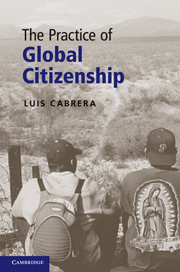Introduction
Published online by Cambridge University Press: 05 June 2012
Summary
Arivaca, Arizona, USA: Presbyterian seminary student Luke Roske pushed through low-hanging branches in a dry creek bed that cut through the desert around this ranching community some fifteen miles north of the Mexican border. He paused and knelt, lighting a cigarette and peering silently up the wash. All around were strewn the signs of fresh migrant travel: empty food tins and gallon water jugs, discarded clothes, shoes, backpacks. Roske shrugged out of his own thirty-pound pack and let it fall to the ground. Inside were several half-liter bottles of water and perhaps a dozen “migrant packs,” the clear plastic bags distributed by members of the No More Deaths humanitarian patrol group. Each bag was stuffed with potato chips, Vienna sausages, crackers, cookies, an electrolyte drink – food to sustain those exhausted or lost in a harsh desert landscape that has claimed more than a thousand crossers’ lives in recent years. Roske tipped his straw cowboy hat back on his head, wiped sweat from his brow with a sleeve, and pulled hard on the cigarette. Nearby, but invisible in the brush, another volunteer called out to any who might be hiding around them: “Somos amigos.” “We are friends.” No one answered (author observation, July 2005).
Tierra Blanca, Veracruz, Mexico: In this city of 45,000 in Veracruz state on Mexico’s eastern coast, where thousands of Central American migrants pass through each day clinging to the tops of freight trains, a group of volunteers prepared for their nightly service. Bearing a massive pot of simmered beans, hot tortillas and coffee in a five-gallon bucket, they emerged from their albuerge, or migrant shelter. Outside on the pavement, perhaps two dozen men sat or lay on makeshift beds of cardboard and blankets, waiting to be admitted for the night. The volunteers passed them and trudged, two per bucket, about three-quarters of a mile to the area around the rail yard. There, they set the food on a folding card table and broke out cups and plastic utensils as a crowd gathered, almost all men, and all waiting to transfer trains and continue their northward journeys. One volunteer, a local evangelical musician named Ignacio Lara, called, “Hermanos migrantes,” or “migrant brothers,” and led them in a prayer. Then each lined up for a cup of beans, tortillas, and sugared coffee. “People here don’t have much, but what we have we try to share with those who have less,” noted Miguel Angel Ochoa Cruz, a founder of the albuerge and deacon of the local church that supports it (author interview, March 2007).
- Type
- Chapter
- Information
- The Practice of Global Citizenship , pp. 1 - 10Publisher: Cambridge University PressPrint publication year: 2010

